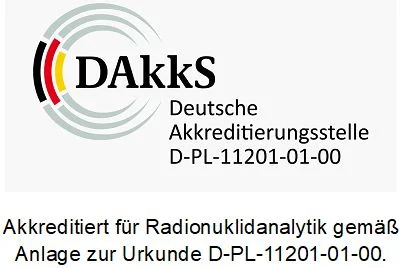 IAF's radionuclide laboratory
IAF's radionuclide laboratory
IAF’s radionuclide laboratory determines nuclides in nearly all matrices
The ISO 17025:2018 accredited radionuclide laboratory of IAF-Radioökologie is capable of determining a wide range of radionuclides in almost all materials and matrices. This includes both artificial radionuclides and natural radionuclides. Part of IAF's accredited scope is flexible ("Flexible Accreditation" within ISO 17025).
Difficult-to-measure (DTM) nuclides are of particular importance, which can often only be separated using advanced radiochemical digestion methods in order to subsequently determine their activity in the appropriate counting devices.
Radiochemists with many years of experience, , some holding PhDs, and trained laboratory assistants process a large number of samples every day using various methods such as aqua regia, hydrofluoric acid, fusion and microwave digestion, centrifugation, etc. Burning gas samples in oxidizers or tube furnaces as well as absorption-desorption systems (e.g., sorption of 14CO2 to determine the biogenic carbon in sewage gas, secondary fuels and other organic substances). Determination of tritium using LSC, sample pre-treatment includes distillation and electrolytic enrichment.
IAF prides itself with an impressive equipment park that enables us to process large numbers of samples within a short turnaround time our clients can rely on. Apart from sample preparation and radiochemical laboratory equipment, we operate the following devices:
- 18 HPGe n-type gamma spectrometers (ultra-low level) suitable for measurements in an energy range from 10 keV including in-situ gamma spectrometer.
- 18 channel low-level alpha-beta counter.
- 42 alpha spectrometers.
- Grid ionisation chambers.
- 2 electrolysers for tritium enrichment,
- 4 ultra-low level liquid scintillation (LSC) spectrometers (TriCarb, Quantulus).
- Monitors for Tritium (H-3), Krypton (Kr-85) and other gases.

In selected cases, mainly for QA purposes, we determine radionuclides by duplicate measurements, using different counting methods (e.g., LSC and Low-Level counting).
Mechanical sample preparation (jar crushers, ball mills), homogenization and aliquoting of solid samples are of particular importance in order to obtain representative results. Considerable experience is required in order to do justice to each individual sample, its origin and our clients’ objectives of the analyses.
To determine the mobilisation of radionuclides, we use standardised and problem-adapted leaching tests, e.g., in overhead shakers, leach test columns and other processes, which we can also adapt to customer-specific requirements. Here, too, many years of experience play a decisive role: the chemical behaviour of the various nuclides such as sorption on the beaker walls must be taken into account in each individual case, in order to get meaningful and reliable results.
Under IAF's radiation safety licence, the laboratory can handle an activity of 1E3 times the exemption levels. However, we can pre-process samples with higher activity in a university facility located closely nearby, which is licenced for up to 1E7 times the exemption levels. Aliquots are produced there and taken to our own lab for further processing.
Thanks to our flexible accreditation, IAF can develop, validate and use new radiochemical processes, and quickly respond to new requirements of our customers.
As part of quality assurance, we have implemented an extensive range of internal and external measures, for example:
- Plausibility checks and trend monitoring of sample series.
- Comparative measurements using various pre-treatment and, where possible, counting methods of randomly selected samples.
- Regular participation in round robin tests at national and international level (e.g., Federal Office for Radiation Protection, IAEA, NPL).
With our experience, we also help customers in individual cases to develop or optimize their own analytical processes. This is how we learn from each other and establish a new level of trustful collaboration.
IAF specialises in radioactive nuclides
In nature there are not only radioactive nuclides, but also stable isotopes, such as H-2 (deuterium) or O-18. These are used, for example, in addition to the radioactive hydrogen isotope tritium as additional parameters in groundwater characterisation. IAF has specialized in the determination of radioactive nuclides. For non-radioactive (stable) nuclides we refer our customers to experienced partner laboratories. However, IAF is happy to take on the sample handling and can thus offer a one-stop service.














 IAF's radionuclide laboratory
IAF's radionuclide laboratory